How Can Fashion Week Be More Accessible?
Whether it's several flights of stairs or a lack of wheelchair ramps, runway show logistics often don't consider those with disabilities.
For me, attending New York Fashion Week is a lifelong dream realized: being immersed in stunning artistry, sitting in the same rooms as A-Listers and seeing icons at every turn... It's an extremely privileged experience, and it's one I'm so grateful to be a part of.
But as luxurious and thrilling as the runways and presentations can be, there's one thing I couldn't help but notice throughout the week: all the stairs.
As someone who deals with chronic pain, climbing up several flights of stairs at a time can be, quite frankly, debilitating. Oftentimes, I wouldn't know that I would need to climb a staircase (or multiple) until I was at the venue; and it wasn't uncommon to be told there wasn't an elevator for myself and other guests with disabilities — visible or not — to use.
My experience is not unique: Accessibility has been a longstanding issue within fashion. A lot of brands don't consider those with disabilities in general when it comes to their product offerings, which leaves a lot of people unable to purchase their clothing. Organizations like Runway of Dreams (which stages inclusive design runways and partners with major brands like Tommy Hilfiger and Target) and Open Style Lab (which fosters collaboration between designers, engineers and therapists to create accessible fashion solutions) have made great strides. So have individuals like Sinéad Burke, Jillian Mercado and more, who have spoken about their experiences and advocated for a more accessible industry. But the logistical oversights of fashion week expose all the work that still needs to be done.
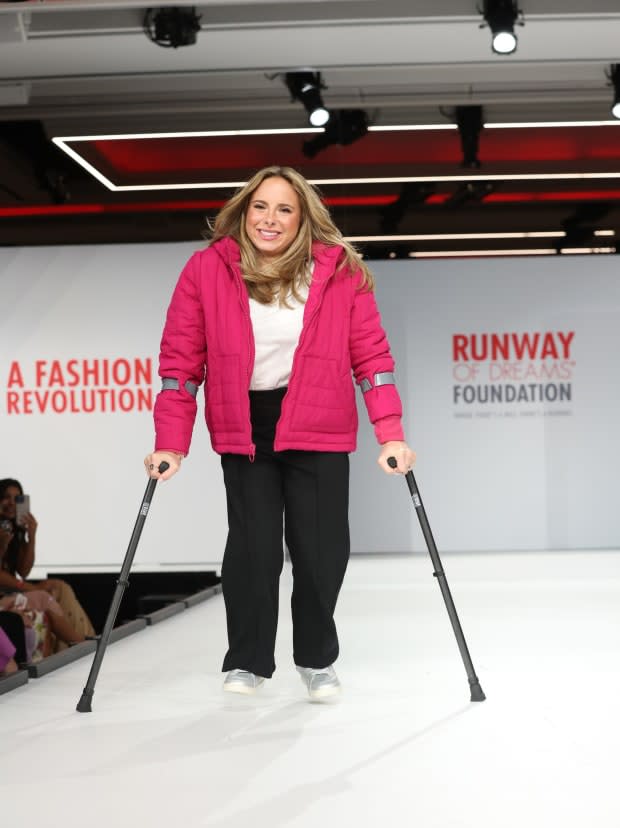
Photo: Courtesy of Runway of Dreams
Since the major fashion weeks take place in large cities, it's not uncommon for events to be held in pre-war buildings with no elevators or wheelchair ramps. It's seemingly commonplace for physical accessibility to be overlooked during the event-planning process, leaving disabled attendees disregarded.
When it comes to complying with the Americans with Disabilities Act (ADA) and the Architectural Barriers Act (ABA), the waters are murky for fashion week, particularly in New York City. Even though private events — like most of New York Fashion Week's are — are legally bound to follow the ADA, it isn't often enforced. A guest facing accessibility issues at an event, however, can file a complaint with the Department of Justice to start an investigation.
"A lot of the work would be on the organizers and PR folks to visit the buildings they're interested in holding the event at, and if one can, to try and have someone with a disability during the site visit to consider the accessibility," Phillip Bratta, a public affairs specialist at the Access Board, tells Fashionista. "We hear a lot of, 'It's going to cost more money' or, 'It's going to make things more complicated.' The response is that you will actually get more business and provide more interest and engagement by making it more accessible, because you're then opening up that space for more people."
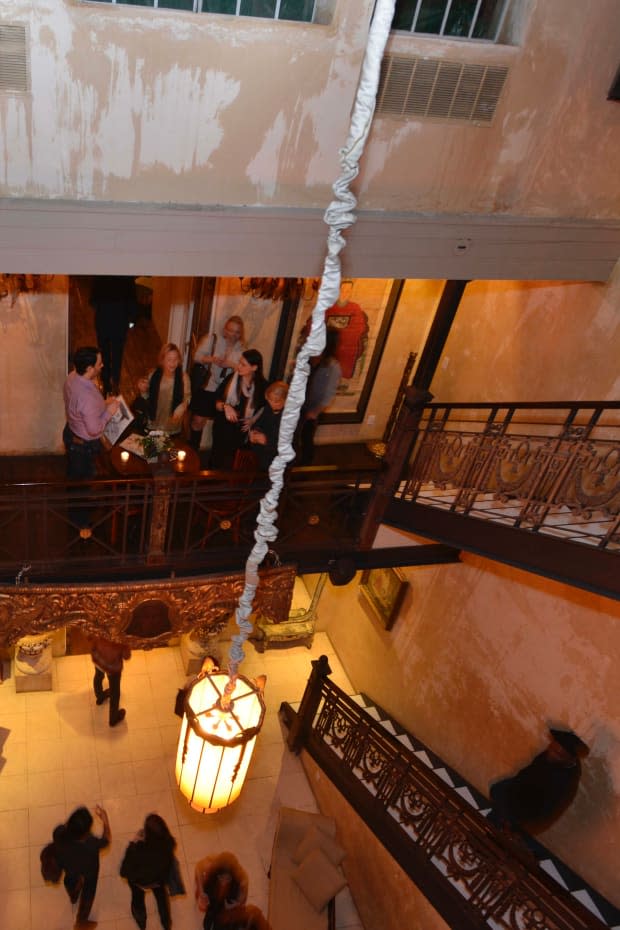
Photo: Eugene Gologursky/Getty Images for Gotham Magazine
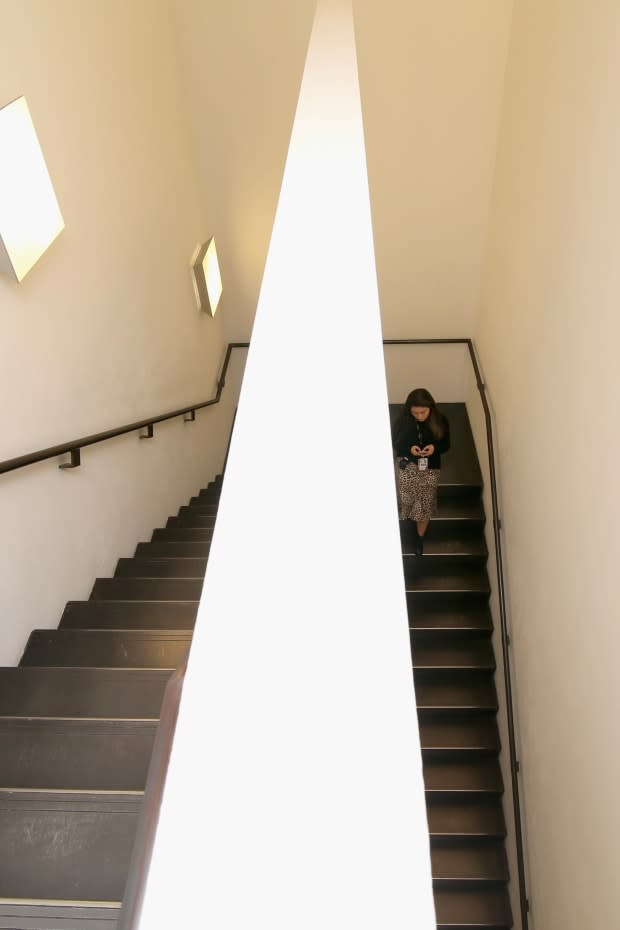
Photo: Manny Carabel/Getty Images
Runway of Dreams founder Mindy Scheier echoes the sentiment: "If it works for people with disabilities, it works for everybody." When it comes to what she thinks is stopping brands from committing to making their events fully accessible, Scheier argues that "there's still a very high level of fear of doing it wrong and not thinking through everything or being called out for this or that. So the response is to just not do it."
Aaron Rose Philip — who was the first model using a wheelchair to appear on the runway for a major luxury house — feels that there are no excuses left when it comes to making fashion shows accessible.
"I've been living [in New York City] my whole life — I went to school here, I've lived my whole life here — and that was accessible," she says. "So why can't New York Fashion Week be accessible?"
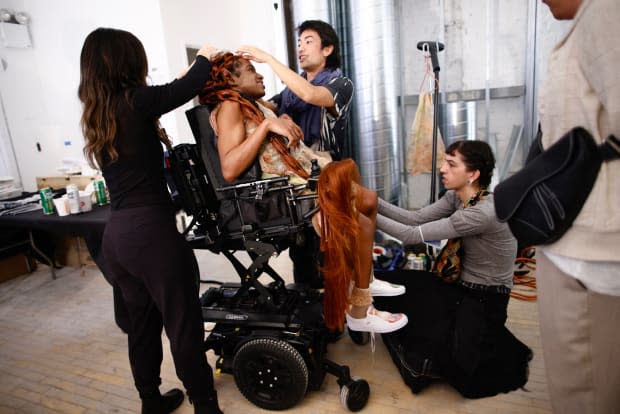
Photo: KENA BETANCUR/AFP via Getty Images
Despite being praised by industry professionals for her modeling, Philip said it's still difficult to find brands willing to accommodate her.
"When clients want to work with me, they have to read my rider, which says, for example, I need someone to help me use the bathroom when I'm on set or help me eat with utensils, things like that," she says. "Either the client will help me there or they won't. If they won't, then we just won't work with the client."
Philip has modeled multiple times for Collina Strada, which she feels is one of the only brands committed to making space for and with disabled talent. "I know them: Hillary [Taymour] and Charlie [Engman], they've always been open to accommodating disabled people," she says.
"Accessibility is the first thing we think about when it comes to attendees and models," Traymour writes in an e-mail. "I think fashion week just needs to be more mindful about inclusion in general."
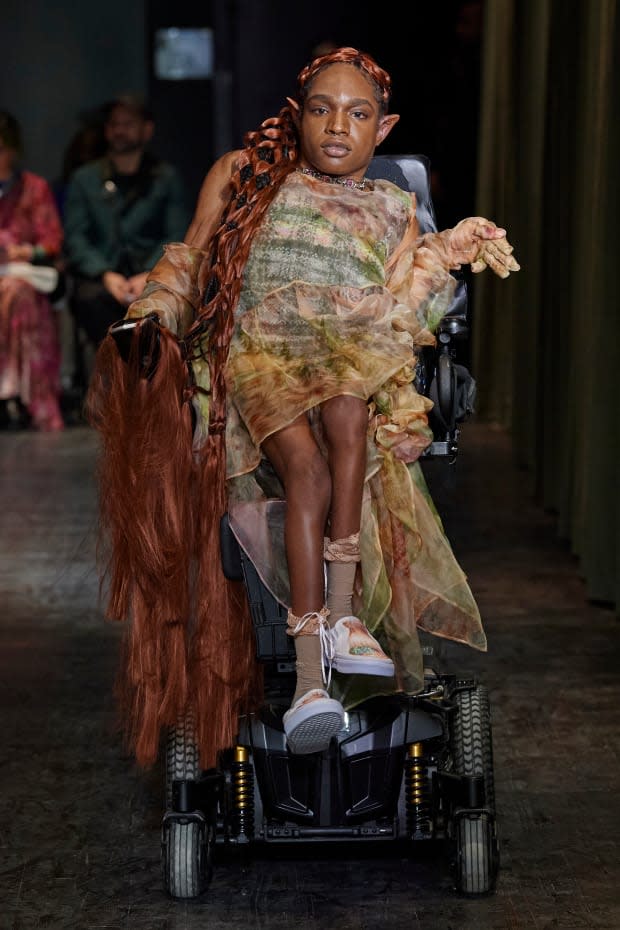
Photos: Imaxtree
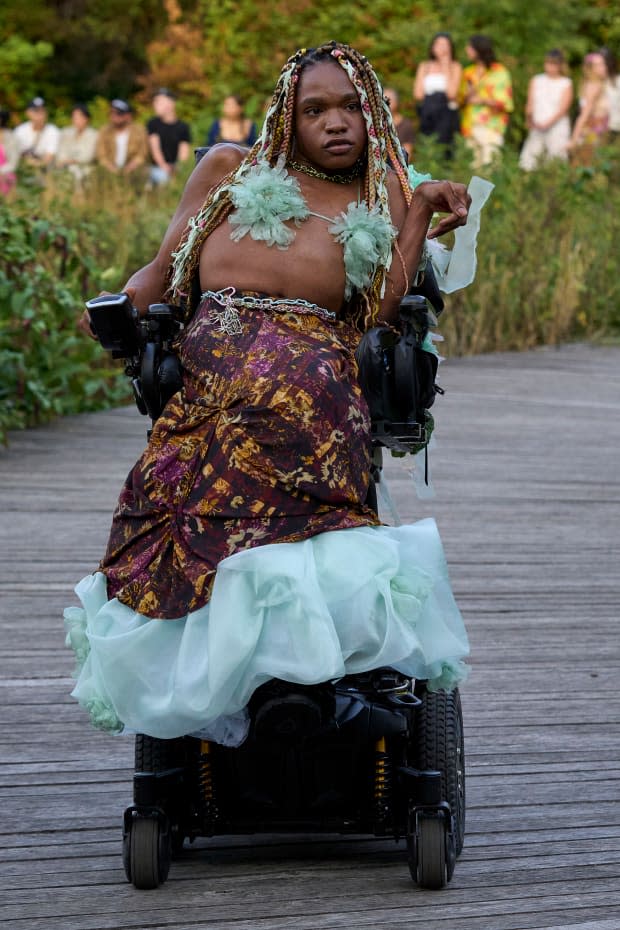
Photos: Imaxtree
When you're invited to a attend runway show or other event during fashion week as a guest (as opposed to talent), there are very few (if any) disclosures about how many flights of stairs you may need to climb, whether there's a wheelchair ramp, if there will be interpreters or closed captioning available for those hard of hearing, or any other logistical concerns that those with disabilities may have.
"When [brands] think about these places with stairs, they think about aesthetics, they think about looks. I don't love how much fashion is based on image versus merit and accommodating people," Philip says. "They will do anything for image, even if it means excluding entire groups of people for an image... It's a huge problem. I want to talk to the CFDA. It's every season that there's only one show that's accessible."
(The CFDA didn't respond to Fashionista's request for comment. IMG, which works on the official New York Fashion Week schedule with the CFDA and produces many of the events on it, declined to speak on the record for this story.)
To Scheier, attendees' accessibility is a priority. "If there's any type of anything that could get caught in wheelchairs, then the space isn't accessible. [Guests] have to be able to get into the venues. There have to be accessible bathrooms," she says. "We really take the time to make sure that it's a safe and acceptable environment."
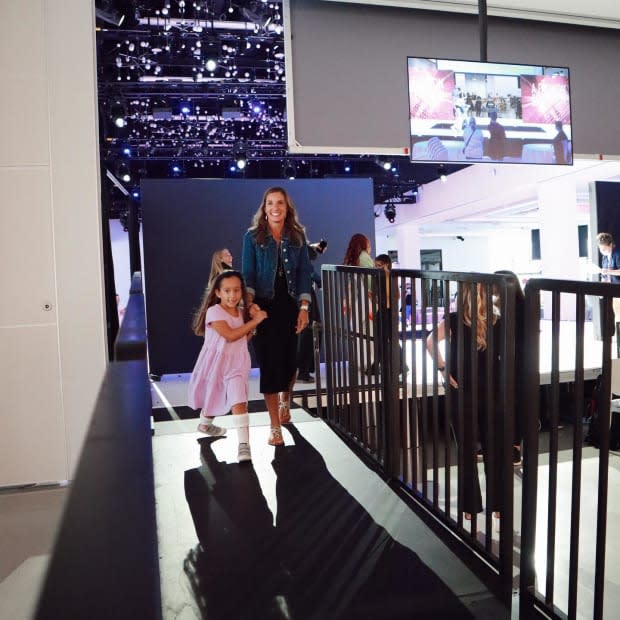
Photo: Courtesy of Runway of Dreams
The argument that cities like New York, London, Milan and Paris are, in many ways, inaccessible by nature — therefore alleviating the fashion industry of any fault for not considering those with disabilities — is a popular one. However, companies like Runway of Dreams dispute it.
"We've had to modify certain venues. We were in Cipriani venues, for example, and they were so supportive and willing to learn about how they can make their venues more accessible," Scheier says. "This shouldn't be a one-hit-wonder. They should be able to have anybody enjoy any event that goes into their venue."
Planning for Fall 2024 fashion week is already well underway, and brands and PR firms need to take the measures necessary to make events as inclusive as they're capable of being. For anyone unsure where to begin, Bratta offers a starting point.
"The Access Board provides free technical services and assistance," he says. "We have accessibility specialists on staff, so anyone — whether you're an architect or an engineer trying to understand what the guidelines and standards are, or if you're just a member of the public — can call our hotline or email us and talk to an accessibility specialist about standards and accessible design."
The Access Board's specialists can be reached by telephone at 202-272-0080 (ext. 3) and by email at ta@access-board.gov. Accessibility training and webinars are also available on the Access Board website. Additionally, Scheier's other company, Gamut Management, consults with companies to better represent and respect those with disabilities.
Though working with professionals and disability experts is essential, there's one thing brands and companies can do that outweighs everything: include disabled people in your conversations.
"[People with disabilities] always probably have the best perspective and can address things that those of us who are able-bodied just don't think about on a daily basis," Bratta says.
Ultimately, the industry needs a wake-up call, according to Philip.
"I just want the casting directors and the designers to wake up and understand how important it is for everyone to be seen, no matter how big the designer is," she says. "Everyone loves and wears clothing — I think it's that simple, and it's that simple to make sure that the venues for the shows have a ramp and the runways themselves have access, that they're still able to hold the beauty of the concept of their show while accommodating everyone."
Never miss the latest fashion industry news. Sign up for the Fashionista daily newsletter.
